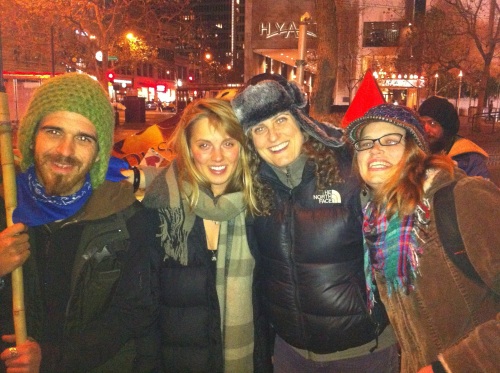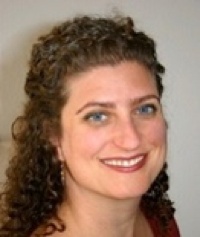“I’m being raped!” screamed Georgia (not her real name) at the top of her lungs. “I’ve BEEN raped…and I’m BEING raped… and I WAS raped–and I’ve murdered people, too!”
Georgia is an elderly homeless woman who had been seen mumbling to herself and talking to auditory hallucinations around the Occupy San Francisco camp site. She was one of the attendees of our first Composting Anger meeting at the camp, which had just commenced five minutes prior.
“No! Not NOW!” barked Georgia, when the class looked at her in shock. “But I HAVE been raped. And I’ve murdered and raped people!” Georgia began to loop these phrases over and over, in a voice that was impossible to ignore, but impenetrable to the concerned questions of her peers.
I had walked into the OSF camp just days before, curious about rumors I’d heard about the growing population of street kids, homeless folk, and “travelers” that had set up shop within the Occupy sites. Some were reportedly committed to the movement, but others were said to be there just for the free food, medical care, and chance to party. Others saw OSF as a chance to hide from the police.
I developed Composting Anger as a response to concerns about violence, substance abuse and disturbed behavior that were weighing down the efforts of the occupiers. I wanted Occupy to be sustainable, and felt that the camp’s difficulties with “metabolizing” distress might detract from its larger goals.
Intoxicated participants were either refusing to attend General Assembly meetings, or were heckling people with whom they disagreed. OSF participants, especially women, had complained that they felt threatened, belittled, or worse. I hoped that Composting Anger would attract participants who might be having problems with anger and violence, but would refuse to speak about it in a formal mental health setting.
With Georgia’s distressed cries, Composting Anger was off and running…in a way I would never have anticipated. While trying to address an overarching problem in the camp—and in our society—we were immediately enveloped in what looked like an acute psychiatric event.
Was Georgia in a state emergency that would have to be addressed immediately? Was she being sexually or physically assaulted in camp? Were her cries those of an abused woman with PTSD flashbacks? Was she chronically schizophrenic, deeply internally preoccupied and off of her psychiatric medications? Intoxicated? Acutely medically ill and unable to name it in a way we could understand? All of the above? Something else entirely?
Flustered, I tried to figure out what Georgia and the group might need while still facilitating the meeting. Once immediate danger and damage seemed unlikely, Georgia’s capacity to be “in the meeting” required assessment. Would she be able to bring in her life experiences while still being able to listen to others? Would she be able to collaborate? I tried a few times to involve her in a conversation about the impact of violence on women and communities. Georgia’s heart-wrenching lament continued, as though she had wanted to join the group, but felt so disturbed about the topic of violence to women that it seemed—literally—to make her feel too crazy to participate.
I told her it was time to stop, and that we couldn’t think productively when she was yelling like that.
The class participants, a varied and gentle group, looked surprised. “She shouldn’t be in this meeting right now,” I said, suddenly feeling like I was back in a teaching hospital, helping medical students to understand how to work effectively and compassionately with acute mental illness. I wondered if the class would find my intervention with Georgia useful, or yet another example of the dehumanizing maltreatment of the mentally ill. “People with histories of trauma and untreated PTSD really need to be mindful about their exposure to further trauma, even if it’s in a second hand conversation,” I said tentatively. “You can see that by the way she was yelling and couldn’t talk when we tried to connect with her. If she had been able to be present, instead of getting pulled into a flashback or a psychotic experience, she could have had a conversation about violence. Right now she needs more immediate help feeling safe. It’s not cruel to stop her from participating in this moment if it is traumatizing her and she is getting too overwhelmed to protect her own emotional state.”
One class participant spoke up: “Okay…but I want everyone here at OSF to have a voice, and to feel respected, and stopping them just feels so out of line with what Occupy is about.”
Others agreed. The group discussed this issue at length. They wanted to give Georgia what they knew our society has stopped being able to provide: a safety net, compassion, concern and respect. They did not want to take away the rights of any Occupy participants, and they did not want to call in external authorities. Keenly aware of the violence and discord around them, they did not know how or when to set appropriate limits with their more impulsive co-occupants, or how to deal with campers who seemed completely apathetic to the goals of the movement.
Two fist-fights and five drunken yelling matches later, Composting Anger group was done for the day. I left wondering what I had actually been able to offer the group. Sure, we had touched on a number of crucial mental health issues affecting the camp and greater society. We talked for about three minutes per topic, between the screaming, traffic, blasting music and constant parade of grossly untreated mental illness and addiction.
It wasn’t until the second class that I learned how important that class had been to its participants. Many had never seen full-blown, untreated mental illness up close, let alone lived with it. My flustered attempts to teach Composting Anger were seen as part of what it means to be part of the imperfectly perfect social experiment that is Occupy. The class was more interested in how I had regained balance in any given moment than if I had lost it at all. I was moved by their commitment to understand how to respond to the needs of their fellow campers. They saw themselves as a living an experiment in interconnectedness, using their own experiences in camp to discover what our society actually needs in order to function sustainably.
Composting, of course, is nature’s process of recycling biologic materials into rich, fertile soil. As a psychoanalytic psychiatrist, I like to think of my work as a kind of composting, a sort of digestive process, where one’s internal garbage is turned into fertilizer for a more rich and rewarding life. I also like to think of the Occupy movement in a similar light: that it provides a chance for some serious composting of how our society is working right now, so that we can extract the seeds of usefulness and turn the toxic elements into fertile opportunities for growth.
Since our first classes together, Composting Anger has evolved into a tremendously useful discussion-and-action group that looks at personal and group dynamics of anger. Its goal is to find a way to “digest” the challenges facing OSF so participants can build resilience in themselves and in the work of Occupy. We explore and “compost” links between internal and external “garbage”, the environment and psychology. While Composting Anger is not a therapy group, it provides opportunities to discuss things that matter and to get ideas for how to manage one’s internal world while being involved at OSF.
I was impressed and moved by how many of the class participants, most young and from a variety of backgrounds, wanted to create a world where people are valued no matter what their circumstances. They learned simultaneously how to set firmer limits with violent or out-of-control campers and how to deepen their compassion. They began to see Composting Anger as an oasis of calm amidst the camp; an internal and external space that provided a chance to reflect, ground, and refocus. They reported feeling this way during times when we weren't in class, as though the internal oasis became portable and transmissible.
What the campers at OSF were able to achieve in a short period of time was nothing short of astonishing. This mosaic of humanity, so varied in every way, shifted from a state of scary chaos into being a cohesive, kind, sober and respectful community. Composting Anger was just one of the variety of programs intended to support the emotional well-being of the occupiers, and to educate the public. OSF felt like an impromptu university of sorts, attended by all kinds of people who are eager to teach and to learn. Composting Anger, it was explained to me by someone who didn't know I ran it, “is a group that tries to break down the crap around us so we can get the good stuff out and create something better." I couldn't have said it any better myself.
As for Georgia, her response to our first class was perhaps the most moving of all. I was told that she came back to OSF the next day, having gone off site for some all-too-brief respite psychiatric care. She did not acknowledge what had happened in the class, but was graciously received back into the camp. She had brought an apple pie and shared it with some other people in our class. And that's what composting anger–or trauma–looks like.









